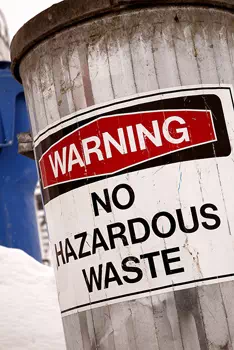Overview
Relevant Activities
Role of Local Governments
U.S. EPA Resources
Other Resources
States
Funding & Financing
Hazardous waste is defined by federal Resource Conservation and Recovery Act (RCRA) and state regulations. In general, hazardous waste is either a specifically listed material (e.g., spent cleaning solvent) or is hazardous due to its characteristics (i.e., ignitable, corrosive, reactive or toxic).
- Solid Waste Disposal
- Emergency Services
- Vehicle & Equipment Maintenance
- Wastewater Management & Sewage Treatment
- Transportation Planning, Operation, and Management
- Public Healthcare Services Operations
Many local governments must deal with hazardous waste at two different levels: (1) as a hazardous waste generator and (2) as the responsible entity for protecting landfills and other municipal solid waste collection/disposal operations from hazardous waste disposal.
Hazardous waste generated by local governments can include waste paint, spent solvents, pesticides, discarded cleaning products, excess/discarded/spilled chemicals, and many other substances. All hazardous waste must be managed according to state and federal laws and regulations and the people responsible for handling the wastes must be trained.
Landfills and other solid waste facilities operated by local governments are generally not designed (or permitted) to handle large volumes of hazardous waste. To minimize the introduction of hazardous waste to these facilities, many communities have provided options for household hazardous waste collection. This is typically accomplished by designating permanent collection/exchange areas at landfills or by establishing special collection days at a central location. These types of operations require permitting by regional EPA authorities or state environmental agencies.
U.S. Environmental Protection Agency Resources
-
Household Hazardous Waste. The options of reduction, reuse, recycling, and disposal-listed in order of EPA's preferred waste management hierarchy-are all important tools to safely manage HHW.
Hazardous Waste Regulations. EPA regulations, or rulemakings, translate the general mandate of RCRA into a set of requirements for the Agency and the regulated community. The RCRA hazardous waste program regulates commercial businesses as well as federal, state, and local government facilities that generate, transport, treat, store, or dispose of hazardous waste.
RCRA/Hazardous Waste Resource Locator. Find your state's regulations, along with permit forms, guidance, contact information and other helpful resources. Deviations from federal regulations are highlighted.
Universal Waste State Resource Locator. Some common items (batteries, pesticides, etc.) may be exempt from hazardous waste rules. Find out which items are designated as Universal Wastes in your state, link to state regulations, and local contacts at state agencies for more information.
-
TSD & Recycling Facilities Locator. Use this on-line directory for locating hazardous waste treatment, storage, and disposal (TSD) and recycling facilities.
For more information on funding & financing programs and options for hazardous waste, please see the Wastes section of LGEAN's Funding & Financing page.


